Unless Russia can somehow change that equation - which no informed observers seem to believe is possible - its forces will inexorably be defeated on the battlefield. JL
Phillips O'Brien reports in his substack:
This week, reporting pivoted from the massing of Russian strength to continuing Russian problems sustaining modern operations. There is a Russian offensive, but it reveals how the war is shifting in Ukraine’s favor and the Russian military is declining in efficiency. As Russian losses have skyrocketed, Russian gains have significantly decreased. This summer, Russian advances, while incremental, were larger than during the last two months. Skyrocketing Russian losses for (shrinking) gains. The Russian Army is declining as an offensive force and the Ukrainian gaining as a defensive force. Unless Russia can change that, they will lose the war.Well, this week shows how quickly the mood music can change in the reporting of this war (which reveals just how problematic the reporting can be. After the week before, when there was all the rather doom-laden talk of an impending Russian offensive of thousands of tanks and massed ranks of aircraft, things changed quite markedly. Instead, the reporting seem to pivot away from the massing of Russian strength to focus on continuing Russian problems in sustaining modern operations.
Another destroyed most modern working Russian tank T-90M. As said by two Javelin anti-tank missiles. By 79th Air Assault Brigade of Ukraine m.facebook.com/story.php?stor…This change in tone might be best seen in the New York Times, which provided this analysis of the failure of the Russian army in attempting to take Vuhledar.
This assault reveals that, instead of military learning, the Russian military continues to suffer from major shortcomings, stretching from the top of the strategic decision making tree (Putin—remember, a nation’s grand strategy rots from the head down) and reaching to the functioning of its small infantry units. Its not worth cataloguing them here as there are so many. However it points out the fact that the Russian military does not seem to be learning terribly efficiently if at all (unlike it has been claimed by some analysts) and at the same time is struggling mightily in attempting complex operations. Btw, This is what Im trying to develop in my mid week-substacks. This week I will build on the last by trying to give a detailed discussion of what military-learning looks like by examining strategic bombing in World War II.
So what is happening in Ukraine and what does it mean? Well, there is a large Russian offensive going on, but it reveals how much the war is shifting in Ukraine’s favor and how, apart from significant learning, the Russian military is declining in efficiency. To do that it might be best to compare Russian losses to Russian gains over the last few weeks to those over the Spring/Summer when the Russians attempted their last mass offensive, to seize as much of the Donbas as possible.
The UK MOD put together this useful chart of how many casualties the Ukrainians are claiming to be inflicting on a month by month basis. Its striking to see just how this has risen in the last two months—by a factor of approximately 4. In April-June (pre-HIMARS) Russia was losing around 200 per day, now its 800.
Update: Chart showing daily average Russian losses as at February 2023. Source: General Staff of the Ukraine Armed Forces.(btw) 800 losses a day is a massacre.
On the other hand, as these losses have skyrocketed, Russian territorial gains have DECREASED significantly. In two months this summer, between the start of May and the start of July, Russian advances, while still halting and incremental, were significantly larger than during the last two months. The Russians seized two medium sized cities (Severodonestk and Lysychansk) and a number of smaller town (Popasna). It wasnt great, but it was something. For the last two months, even with Russian casualties skyrocketing, the Russians cant even take Bakhmut. There advances have been sub-incremental. If you want to go into the data, try the Institute for the Study of War daily updates for today and January 1, 2023.
https://www.understandingwar.org/backgrounder/russian-offensive-campaign-assessment-february-18-2023
So we have a situation of skyrocketing Russian losses on the offensive for corresponding declining gains. This is the Russian Army declining as an offensive force and the Ukrainian gaining as a defensive force—this is the big story of the last two months—not some ‘massive’ Russian offensive.
I know its not a dramatic or breathless way of looking at war—but it is the better way. The trends of Russian efficiency are going down and Ukrainian are going up. Unless Russia can change that, they will lose the war. Btw, was really pleased and flattered to see this view of war being discussed by Paul Krugman and Ezra Klein on their latest podcast.
“Our great old standby — core inflation — has turned out to be a really, really misleading number at this point,” @paulkrugman tells @ezraklein in today’s episode about America’s inflation story and the state of the economy.Here is the text of how the book, How the War was Won, understood war.
https://www.nytimes.com/2023/02/17/opinion/ezra-klein-podcast-paul-krugman.html?showTranscript=1
“I have recently reread “How the War Was Won” by Phillips O’Brien, who’s a military historian. And it’s a book about World War II, but he’s become a prolific commentator on the war in Ukraine, and it’s mostly — it’s this wonderfully unromantic, anti-glory view of war. It’s all about, look, it’s really about — modern war is about production and logistics. The opening sentence is, I think, “There were no decisive battles of World War II.” And it opened my eyes to thinking about how both about that history and about how to think about what’s happening in Ukraine now.”
What Are They Thinking in Washington?
This was maybe the strangest week of signalling from Washington DC about the real intentions underlying US policy. Things kicked off with this Washington Post story early in the week, with some pretty heavy-handed warnings to Ukraine about how long the US might continue to support its war effort. Eliot Cohen, rightly took it to task for its extraordinarily counter-productive messaging.
A number of layers of folly in this piece; strong thread to follow, beginning with the deliberate leak to the press of a dangerous view. washingtonpost.com/politics/2023/… 1/8It was the start of a real ping-pong of messaging. Secretary of State Blinken then chipped in with a far more reassuring message for Ukraine about the support they will receive and the legitimacy of their territorial claims—including to Crimea.
Very different emphasis by @SecBlinken on the need to respect Ukrainian territorial integrity and the ‘Pandora’s box’ opened if Russian annexation were legitimised. Administration might have realized the problem with the @washingtonpost story.Things seemed to get even better for Ukraine at the Munich Security Conference, where US officials toughened up their line on Russian war crimes being committed on Ukraine, and seemingly increased the US security commitment to Ukraine.
News: US has formally determined Russia committed “crimes against humanity” in Ukraine, @VP Kamala Harris says at Munich Security Conference. “To all those who have perpetrated these crimes—and to their superiors who are complicit in those crimes—you will be held to account.”And then—guess what, it came out that Blinken also said on a phone call that Crimea might be a ‘Red Line’ for Russia (and presumably not be returned to Ukraine.
https://www.politico.com/news/2023/02/15/blinken-crimea-ukraine-putin-00083149
Apart from the fact that its strange that the US is discussing Russian red lines, in essence providing them some legitimacy, this chaotic messaging seems important. My guess is that we have some idea that the administration’s views of an eventual settlement between Ukraine and Russia probably involve some kind of compromise whereby Ukraine gets all of its territory back except for Crimea and Ukraine in exchange gets security guarantees.
I’m not going to comment on that as a settlement—but within the wildly conflicting evidence, that seems to be something emerging. And it runs in synch with the military view that has come out of Washington for months, particularly from CJS Milley, who has always been more skeptical about Ukraine being able to retake Crimea militarily.
So there we have it. I would say these are the two big-stories of the week. Russian efficiency is declining as an offensive force and the Biden Administration’s ideas on an eventual peace deal, while seeming a little scattered, are actually coming into focus.



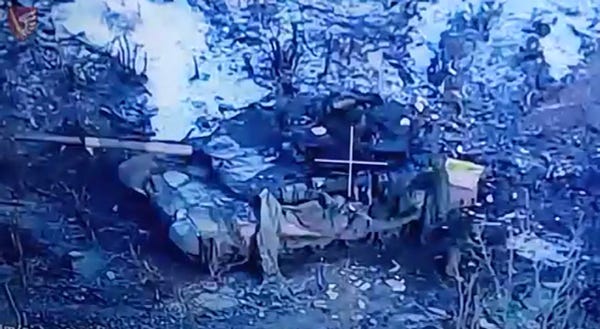
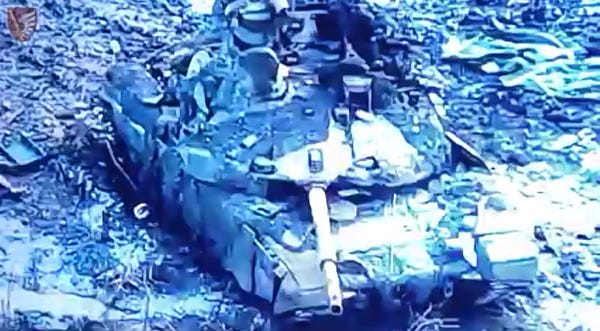
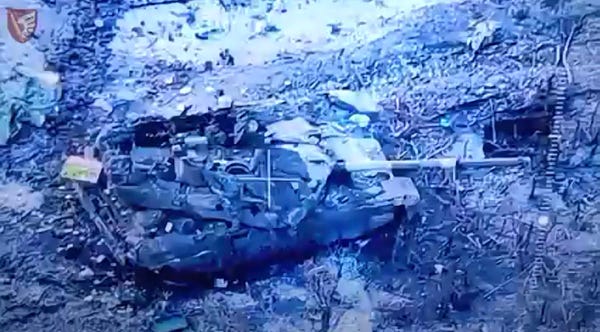




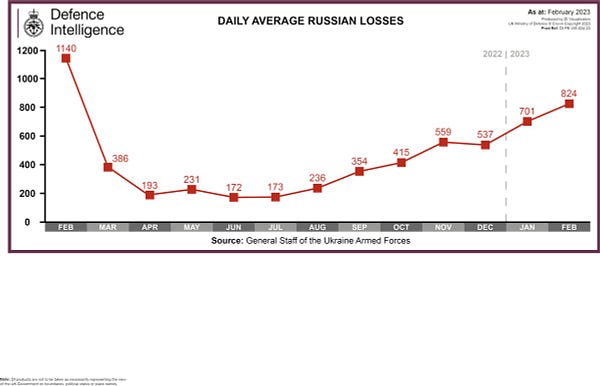



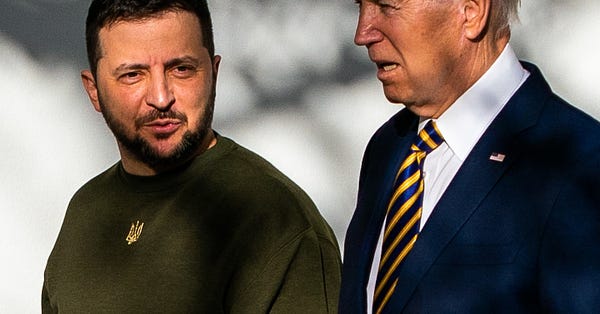






















2 comments:
Ideal and Most economical Jabodetabek Confidential Classes, each of our employees plus instructors arrive to your property, fixed your individual examine program which enable it to pick out almost any area associated with analysis ... go to https://privat-inggris.netlify.app/kursus-bahasa-inggris-koja.html for more details
You will see a cheaper fee as opposed to table above, make sure again concerning the qualifications of the teacher / Kindergarten teacher recommended to you personally ... for more information https://matematika-exed.blogspot.com/2022/05/les-privat-matematika-terdekat-di.html
Post a Comment